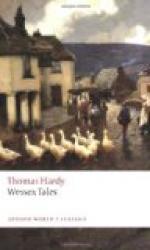Darton, the father, had been a one-idea’d character, with a buttoned-up pocket and a chink-like eye brimming with commercial subtlety. In Darton the son, this trade subtlety had become transmuted into emotional, and the harshness had disappeared; he would have been called a sad man but for his constant care not to divide himself from lively friends by piping notes out of harmony with theirs. Contemplative, he allowed his mind to be a quiet meeting-place for memories and hopes. So that, naturally enough, since succeeding to the agricultural calling, and up to his present age of thirty-two, he had neither advanced nor receded as a capitalist—a stationary result which did not agitate one of his unambitious, unstrategic nature, since he had all that he desired. The motive of his expedition to-night showed the same absence of anxious regard for Number One.
The party rode on in the slow, safe trot proper to night-time and bad roads, Farmer Darton’s head jigging rather unromantically up and down against the sky, and his motions being repeated with bolder emphasis by his friend Japheth Johns; while those of the latter were travestied in jerks still less softened by art in the person of the lad who attended them. A pair of whitish objects hung one on each side of the latter, bumping against him at each step, and still further spoiling the grace of his seat. On close inspection they might have been perceived to be open rush baskets—one containing a turkey, and the other some bottles of wine.
‘D’ye feel ye can meet your fate like a man, neighbour Darton?’ asked Johns, breaking a silence which had lasted while five-and-twenty hedgerow trees had glided by.
Mr. Darton with a half-laugh murmured, ’Ay—call it my fate! Hanging and wiving go by destiny.’ And then they were silent again.
The darkness thickened rapidly, at intervals shutting down on the land in a perceptible flap, like the wave of a wing. The customary close of day was accelerated by a simultaneous blurring of the air. With the fall of night had come a mist just damp enough to incommode, but not sufficient to saturate them. Countrymen as they were—born, as may be said, with only an open door between them and the four seasons—they regarded the mist but as an added obscuration, and ignored its humid quality.
They were travelling in a direction that was enlivened by no modern current of traffic, the place of Darton’s pilgrimage being an old-fashioned village—one of the Hintocks (several villages of that name, with a distinctive prefix or affix, lying thereabout)—where the people make the best cider and cider-wine in all Wessex, and where the dunghills smell of pomace instead of stable refuse as elsewhere. The lane was sometimes so narrow that the brambles of the hedge, which hung forward like anglers’ rods over a stream, scratched their hats and curry-combed their whiskers as they passed. Yet this neglected lane had been a highway to Queen Elizabeth’s subjects and the cavalcades of the past. Its day was over now, and its history as a national artery done for ever.




